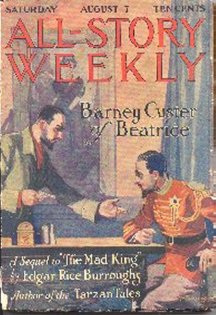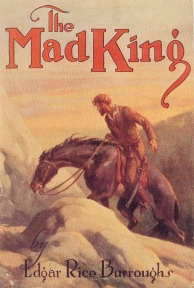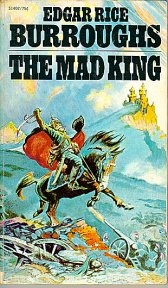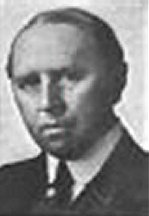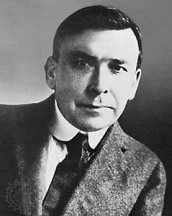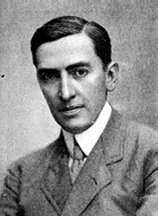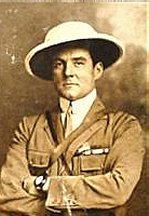The hero of the novel,
Grenfall Lorry, immediately puts one in mind of the Arrow collar and shirt
ads. Richard Harding
Davis personified, probably the ideal American male in appearance.
One can contrast that ideal with the swarthy, unshaven, sweaty, slovenly
type now being offered the public as something to aspire to.
Grenfall has an upper economic
class tone, not so plebeian as Joe, Jack or Jim. Throughout the novel
he is quick witted impetuous even reckless but because of his audacity,
soon to be styled chutzpah, always successful while his European counterparts
are vile, slow and cautious and almost certainly would fail but for Grenfall.
The answers just seem to come to him from out of the air. It is marvelous.
Slowly his ways win out in the
mind of the princess, I almost said corrupted her mind for her moral ideals
were slowly eroded as integrity becomes less important than gratifying
her desires. But then, that too is America isn't it? A deal's
a deal only if you've got the money to back it up in court in which case
a contract is a contract but then again it might not be, depends on circumstances
and the 'integrity' of the court.
Graustark itself is a fanciful
place in which brash young Americans are deferred to and dreams do come
true if one only persists. Can't give up. Plenty of castles
and monasteries hanging on cliffs, thick with donjons and the like, Parrishian
bubbles floating in the air, quite charming dream sequences, the feeling
which Maxfield Parrish captures so well. Reproductions of Parrishes
work were beginning to proliferate. Howard Pyle was an influence on Burroughs'
illustrator J. Allen St.
John as Maxfield Parrish also seemed to be.
While it is very easy to see
the influence of Graustark on Burroughs there is very little resemblance
in the two stories to each other. Burroughs retains the love
behind a throne theme in a barely recognizable form. While McCutcheon's
Grefall Lorry is of the American aristocracy of wealth living in Washington
DC, Burroughs' Barney Custer is a gritty hick from Beatrice, Nebraska,
pop. 30 or so. The Mad King was written in two parts separated
by nearly a year in real time and an eon in psychological time. The
Great War began between the writing of the two halves so that while the
Lutha of the first half more closely resembles Zenda and Graustark the
second half jumps ahead a century into a new era in time with motor cars
and heavy artillery.
The first half may have been
written to placate ERB's wife Emma. By the end of 1913 she may have
bitten her nails to the quick while she berated ERB every day for his spendthrift
habits. While ERB wrote an ode to Poverty in the spirit of Edwin
Hawkins' 'War, (spit) Who Needs It?, if you remember the...ah...tune, Emma
with three children to feed had endured the period of poverty with different
feelings. Now, in 1913,
with the money pouring in ERB with breath taking confidence for the future
was spending it before he had it or even written the books to get it.
To Emma it must have seemed a replay of Idaho when ERB gambled away their
last forty dollars.
It may have been clear to ERB
that he was over the top where the money would never cease coming in, which,
indeed, turned out to be the case, but to many others including Emma he
seemed to be the same old joker who would be back on the street soon.
Emma yearned for some security,
money in the bank, which ERB was loath to provide. His is an interesting
case. No sooner did he begin to have a good year in 1913 than he
packed up family and kids and used car and headed for the sunshine of San
Diego in the most expensive first class manner. This expenditure
wasn't based on savings but in the hope of future income. '13 was
an anno mirabilis for ERB during which even traveling and vacationing he
was able not only to write but to sell a fabulous number of words.
This has been told often but it is so extraordinary, I, who have never
received a penny from my writing have difficulty letting it sink in.
ERB would later boast, while Emma undoubtedly stood by shuddering, that
he literally had to wait for checks from his writing to pay his expenses
from day to day. He obviously had an urge to live with one foot over
the precipice.
You can understand why Emma was
on edge.
Thus in late 1913, while they
were anxiously watching the mailbox for a check, I'm sure, ERB sat down
to write the first half of this novel which, I believe was meant to placate
Emma and let her know that the bozo she thought she married was a bozo
no more. Not totally reformed, perhaps, but reformed. When
Herb Weston wrote at the time of the divorce that no other woman would
have put up with ERB's eccentricities this must have been an example of
what he was talking about.
Zenda involved lookalikes as
does Mad King so people assume that Burroughs copied Hope.
Maybe, but I don't think it's necessarily so. Burroughs with his
split personality didn't have to copy anybody, he was two different people.
Burroughs didn't even disguise that he was talking about he and Emma.
He calls the Ruritanian princess Emma. He introduces his friends
Bert and Margaret Weston as the characters Bert and Margaret of Beatrice,
Nebraska where they really lived. He even has them in the corn milling
business which they really were.
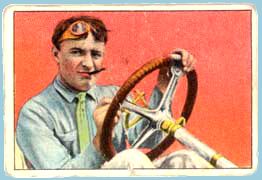
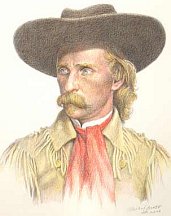
He calls himself Barney Custer.
Custer after the failed General of the Little Horn and Barney after the
famous race car driver, Barney 'Mile-A-Minute' Oldfield. B. Custer
gets his rig up to 90 per besting old 'Mile-A-Minute' by half. In
1913 that would still be going some. Burroughs can be quite unintentionally
comic.
ERB must have known he goofed
back in Idaho with the card trick but now that he had found the handle
he'd become a new man, a real man, a whole man, a made man, which augured
for a bountiful future for Emma so she could now stop treating him like
a clown and revert to her pre-card game opinion of him.
But it wasn't that easy; he'd
been a goof for too long. In the succeeding novel, Nu
Of The Neocene, when Emma had apparently rejected his offer, Barney
Custer shows up at Tarzan's ranch in Kenya but without Emma, escorting
his sister Victoria instead.
ERB would give Emma a last chance
to take the new him over the old one in Tarzan
And The Ant Men when she has a choice between the goofy Esteban
Miranda Tarzan lookalike and the real Tarzan. Emma chose Esteban
Miranda thereby sealing her fate.
The choice of the title Mad
King is significant. The blow to the head ERB received in Toronto
had affected his reasoning so that to others he appeared goofy or mad.
His mental state was accentuated by an acute feeling of failure.
His father not only told him he was a loser but apparently told everyone
else too. ERB's friend Bert Weston who knew both George T. and ERB
says that he often defended
ERB to his father. George T. told Weston that ERB was 'no good.'
Weston defended ERB to George T. insisting ERB was plenty good but that
the goodness hadn't come out yet. I didn't have a father, my mother
divorced while I was an infant so I don't have this sort of father problem,
but I imagine when your father continually tells you you're a loser it
must have some effect on your attitude.
So when your father detests you,
you get cracked on the head and then you lose your wife's confidence because
of your own stupidity is it any wonder, that when you find not only success
but big success and not only money but big money, you go off your head
a bit. But then, even that looks goofy But she stuck with him;
she stood by her man.
ERB even celebrated his dead
father's birthday every year of his life which is beyond me.
Thus one aspect of The Mad
King is Barney Custer the able, confident American. Burroughs
continues McCutcheon's theme of the superiority of the American although
both author's belief in hare brained schemes seems astonishing in this
day and age. The other aspect is Leopold the cowardly, ungrateful
king of Lutha. Both writers use terms like 'king' in a contemptuous
way. Kings are hereditary while any self-made American man is a true
and better king in his own right while he can someday be President of the
United States if he so chooses. Even a hick like Barney.
Emma as 'Emma' is confronted
with a choice between these two lookalikes. She quickly prefers the
self-confident able American Barney Custer, or in other words, the new
ERB, but tradition binds her to the despicable King of Lutha. By
which ERB means to say, I imagine, that she can forget the old him and
accept the successful money making author Edgar Rice Burroughs to whom
money is nothing. Written in late 1914 Burroughs had had another
astonishingly successful year. Two in a row, get that, Emma.
She didn't.
If the couple had only ERB's income
from book royalties, which were not in sight in 1913 and early 1914 to
look forward to, I think Emma's fears might have been at least partially
justified. ERB didn't ever really make that much money from his royalties.
Good money but not that good. ERB might have but Emma probably didn't
see the potential of the movies. Probably neither realized at the
time the value of the intellectual property Burroughs had created in Tarzan.
Had Emma known she might have reevaluated her husband. Probably not
though.
Mad King breaks off with
Barney Custer leaving Lutha to return to Beatrice with his relationship
with the Princess unresolved. We are told that Emma read these stories
before they were submitted. If so then she could hardly have missed
the import of the failure. She either missed the message or disregarded
it.
The second half of the novel
was written largely in October
of 1914 nearly a year later. The world ERB and his fellows had
grown up in had now all but disappeared in the smoke of the guns of August.
The second half is dominated by the opening months of the Great War.
ERB concentrated on the southern Austrian-Serbian front siding with the
Serbs in the battleground Lutha has now become. The novel is taken
up with the intrigue of Leopold and Peter of Blentz with the Austrians
to turn the country over to them. Barney and Emma and her father
are attempting to keep Lutha on the Serbian side while maintaining Lutha's
independence. ERB gives the Serbians some much needed advice on how
to conduct the war. He must have been studying the conflict carefully.
As Barney and the King are indistinguishable
doubles, they were indeed two aspects of ERB's personality, Emma is always
in a great deal of confusion as to which double she was dealing with, always
hoping it was Barney. Indeed. The Mad King Leopold is killed
leaving Barney the last standing. At this point it would seem that
ERB is telling his Emma: See. The old me you thought was a goof is
dead; this is me and I want your love and respect.
Perhaps true but it takes more
than a simple assertion to change a woman's mind. You have to have
time and patience and wait. Emma Burroughs must not have changed
hers quickly because in the next story, Nu Of The Neocene, Barney
Custer is traveling without Emma, going to Africa with his sister Victoria
instead.
One imagines that ERB's personal
Zenda, Graustark or Lutha disappeared in smoke as had the nineteenth century.
His hope and dream of entering that magic land somewhere over the rainbow
in a land of perptual Spring would have to be sought with someone other
than Emma.
In a very few years he would
meet that other hope of another and better world in Hollywoodland which
should have been a warning to him as he would learn the hard way that the
answer always lies within as difficult as that may be to recognize.
The Rainbow Trail begins and ends at your own two feet.
If birds fly over the rainbow
Why then, oh why, can't I?

